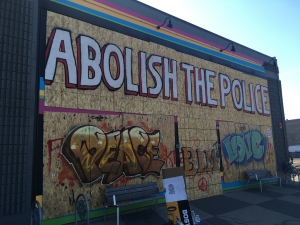United States News
See other United States News Articles
Title: How Individual Professional Liability Insurance Could Reform US Policing
Source:
The Society Pages
URL Source: https://thesocietypages.org/special ... ance-could-reform-us-policing/
Published: Jun 11, 2020
Author: Stephen Wulff
Post Date: 2020-06-17 06:03:14 by Deckard
Keywords: None
Views: 1342
Comments: 3
Introduction & Background In the aftermath of George Floyd’s murder, activists and policy makers are advocating for fundamental reforms to stop police violence. Requiring police to carry their own liability insurance is an idea that has already attracted significant support. Having studied the push for police misconduct insurance in Minneapolis, I can provide some background on both the proposal and the social movement behind it. For example, municipal-level insurers compel police agencies to adopt policies that reduce misconduct (e.g., amending use of force policies) and can raise premiums in response to violations or deny coverage altogether. Most large cities self-insure, which means that misconduct-related payouts due to civil lawsuits come from city budgets, so their police conduct policies and practices are not affected by private insurers. Because misconduct lawsuits tend to be paid out from a city’s general budget or insurer, police departments, like individual officers, rarely pay. Officers who are repeatedly sued for misconduct are also rarely punished and have little financial incentive to change their behavior. Thus, a central way that police violence and police impunity is perpetuated is through financial immunization of officers. A central way that police violence and police impunity is perpetuated is through financial immunization of officers. One potential accountability mechanism and alternative means of reducing legal liability for police and municipalities that has been largely overlooked by the public and policing scholars is mandatory individual professional liability (misconduct) insurance for officers. This novel accountability mechanism would work like automobile insurance. Drivers who engage in serious and repeated car accidents have higher insurance premiums. Likewise, officers who engage in grave and repeated incidents of misconduct would have higher premiums. Thus, officers would have financial incentives to avoid misconduct and the increased premiums that they would then have to pay. If a driver has too many accidents, a car insurer can drop coverage, and the driver is no longer permitted to drive. Likewise, if an officer were to commit repeated misconduct, a private insurer could drop coverage. Furthermore, police departments could require officers to carry their own insurance. If they could not get such insurance, police officers, especially repeat offenders, would become unemployable, taken off the streets, and no longer pose a threat to public safety. In recent years, Minneapolis has been at the center of reform efforts to require police to carry professional liability insurance. In 2016, the Committee for Professional Policing (CFPP), a police accountability group in Minneapolis, Minnesota, attempted to make Minneapolis the first city nationwide to require municipal-level police to carry professional liability insurance. Although a 2016 ballot campaign ultimately failed, CFPP raised national consciousness about this novel, potential reform. In the wake of George Floyd’s death, CFPP leaders—along with other major police accountability groups in Minnesota, including two chapters of Black Lives Matter—have proposed a host of reforms to end police violence, including a renewed push to require officers to carry such insurance. 
Graffiti proclaims, “Abolish the Police,” “Peace,” “BLM,” and
“Love” on the wall of Moon Palace Books. Photo by Stephen Wulff.
Post Comment Private Reply Ignore Thread
Top • Page Up • Full Thread • Page Down • Bottom/Latest
#1. To: Deckard (#0)
Ah, I can visualize it all now. When a bad guy starts to draw a gun on a cop – the cop stops before shooting him to ponder if his “own personal liability insurance” will cover him in this situation and will it “raise his premiums” in his response to protect his life or perhaps even “deny coverage altogether.” Everyone wants to get onto the reform police / defund police band wagon. Get fucking real …
The cops need to do their jobs and shoot more black lives matter rioters.
I agree. That has the added benefit of reducing the number of bad guys out there, thus reducing the odds of encountering a bad guy in the future, thus reducing their insurance premiums! Win, win.
How Individual Professional Liability Insurance Could Reform US Policing How Individual Professional Liability Insurance Could Reform US Policing
#2. To: Deckard (#0)
#3. To: A K A Stone (#2)
The cops need to do their jobs and shoot more black lives matter rioters.
Top • Page Up • Full Thread • Page Down • Bottom/Latest
[Home] [Headlines] [Latest Articles] [Latest Comments] [Post] [Mail] [Sign-in] [Setup] [Help] [Register]
